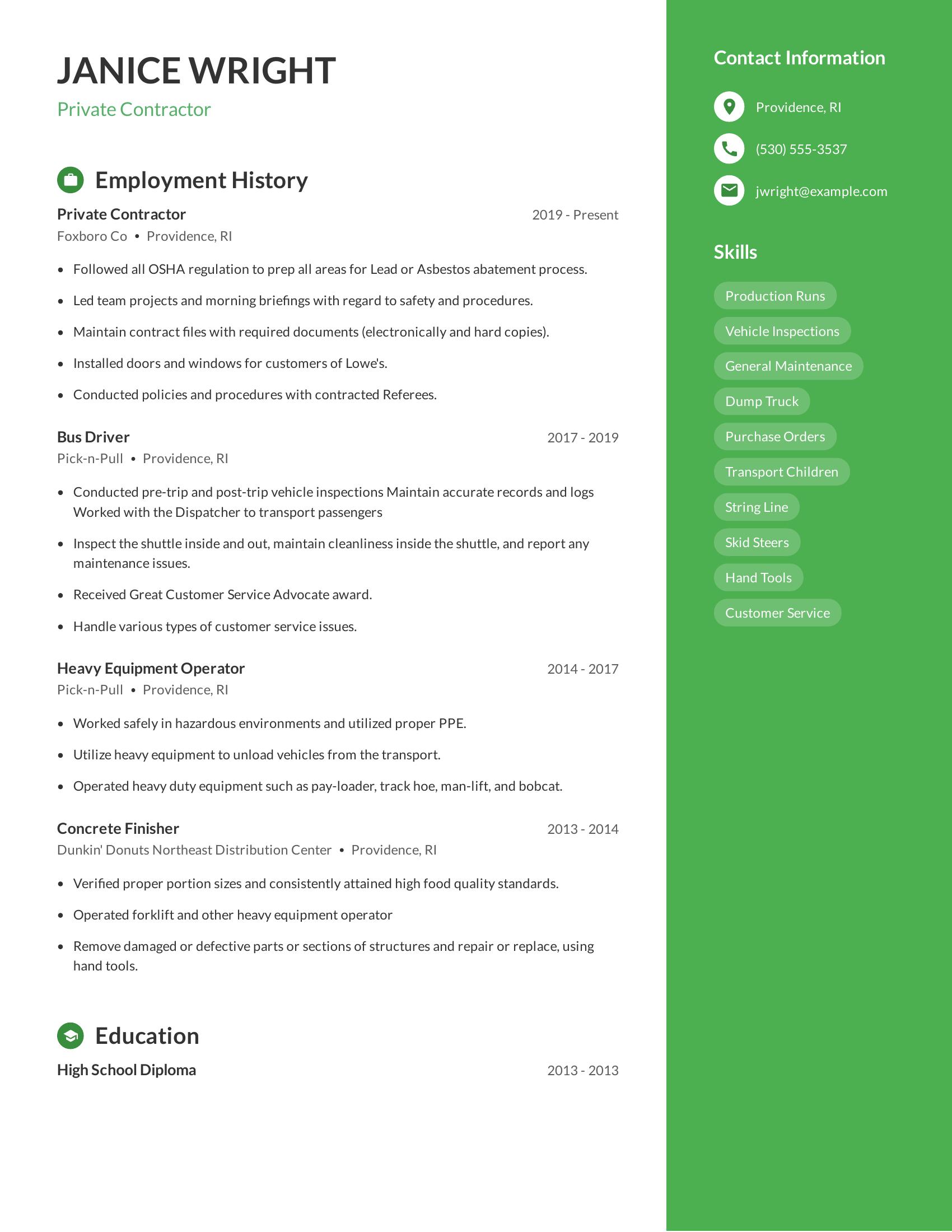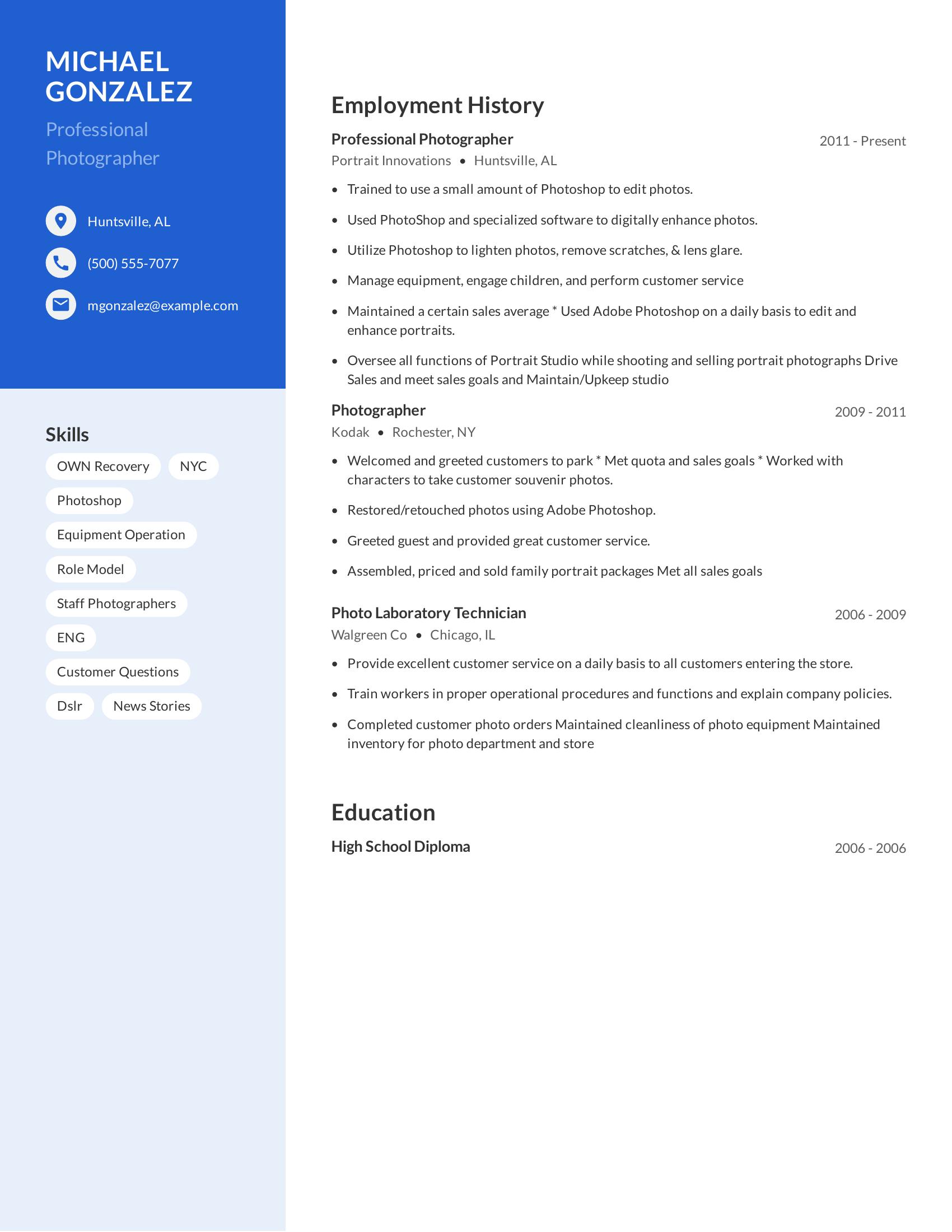4 Self-Employed Resume Examples




Self-employed resumes should highlight relevant skills, experiences, and achievements. It should include a clear job title, contact information, work experience with specific roles and responsibilities, and notable accomplishments. Emphasize versatility and adaptability gained through self-employment. Mention any specialized services provided or projects completed to showcase expertise and reliability.
This resume includes specific experiences such as installing communication equipment, providing tax preparation services, and aiding in office management. It also lists experience as a professional photographer with tasks like updating websites and editing photos. Previous roles include account coordination with responsibilities like managing customer accounts and presenting product demonstrations. This showcases a range of skills and adaptability in various fields.

Private contractor resumes should highlight relevant work experience, specific skills, and adherence to safety regulations. They should also include any certifications or awards. A good resume will show a clear career progression and demonstrate the ability to handle various tasks. It should be concise but detailed enough to show the candidate's qualifications and reliability.
This resume includes solid examples of relevant work experience, from leading team projects to conducting policies and procedures. It also shows a range of skills such as installing doors and windows, operating heavy equipment, and providing customer service. The inclusion of awards and accurate record-keeping further strengthens the candidate's profile. This resume effectively demonstrates the candidate's capabilities and reliability in different roles.

Professional photographer resumes should highlight relevant skills, employment history, and educational background. Key components include proficiency with photography software like Photoshop, experience with camera equipment, customer service skills, and any specialized training. Employment history should detail roles, responsibilities, and accomplishments that showcase expertise and reliability in the field. A good resume will also demonstrate the ability to manage photo shoots, enhance photos digitally, and meet sales goals if applicable.
This resume includes many of these specifics. It lists proficiency in Photoshop, customer service skills, and experience with camera equipment. The employment history section details various photography-related roles, including responsibilities like editing photos, managing studio functions, and meeting sales targets. Additionally, it mentions relevant job titles and companies, providing a clear timeline of the applicant’s career progression and expertise.

Business owner resumes should highlight relevant skills, employment history, and educational background. They need to show leadership in business operations, strategic planning, and financial management. Important skills include business development, product development, human resources, and sales transactions. Employment history should demonstrate a progression of responsibilities and achievements. A clear contact section and a concise summary of skills are also vital.
This resume includes those specifics by listing key skills like safety procedures, business operations, and administrative assistance. The employment history shows a progression from sales clerk to business owner, detailing responsibilities such as budgeting, strategic planning, and customer relationship management. The resume also includes contact information and education background.

Owner resumes should highlight experience in leadership, business management, financial oversight, strategic planning, and customer relations. A well-rounded resume includes a clear job history showing career progression, specific responsibilities, and measurable achievements. Skills should be relevant to the job and demonstrate a mix of technical and managerial expertise.
This resume effectively includes these specifics by listing a progression of roles from systems engineer to software engineer, team leader, and finally owner. It details responsibilities such as developing strategic plans, controlling finances, analyzing financial statements, and supervising staff. The skills section is relevant and varied, covering technical abilities like Unix and Active Directory as well as managerial skills like direct supervision and sales activities.

Highlight Specific Achievements. Show concrete results like "increased client base by 30%" or "completed 50 projects annually" to prove your impact.
Emphasize Relevant Skills. Focus on skills that match the job you're seeking, such as project management, client relations, or technical skills.
Use Clear Job Titles. Clearly state your role, like "self-employed web developer," to make your experience easy to understand.
A self-employed person's resume should highlight their ability to manage projects, clients, and business operations. Focus on relevant experience, skills, and achievements that show proficiency in your field. Include a professional summary, work experience, skills, education, and any certifications or licenses.
A good self-employed summary should highlight your skills, achievements, and services. It should be clear and concise.
Follow these tips to make your self-employed resume summary stand out.
A self-employed experience section should highlight specific skills, achievements, and responsibilities. Focus on what you accomplished and how you solved problems.
Make your self-employed experience stand out with clear and relevant details. Use numbers to show results and be concise.
Here are the 5 most important hard skills for a self-employed person.
Here are the 5 most important soft skills for a self-employed person.